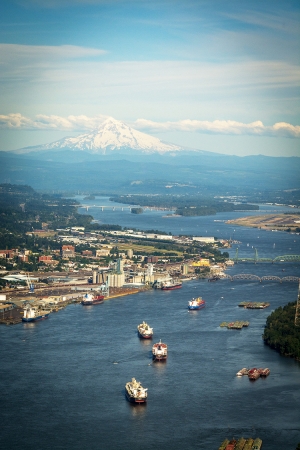


(Posted on 12/04/22)
In collaboration with US Customs and Border Protection (CBP) and the Foreign Trade Zone Board, the Port of Vancouver USA has activated Foreign Trade Zone (FTZ) #296. The Port of Vancouver USA is primarily a bulk import and export facility with dedicated facilities for specific commodities, such as grain, soy beans, corn, mineral ores, concentrates, fertilizers, clays, bauxite and agricultural commodities.
One of the port’s wind energy customers will be the first to utilize the newly activated FTZ.
Foreign Trade Zones (FTZs) are important economic development tools that the port can utilize to help local companies and surrounding communities grow. FTZs offer a temporary duty-free zone to customers who are importing or manufacturing products from globally sourced materials. A duty is a tax levied by governments on the value of imported products. Often individual materials will have a higher duty rate than a finished product. The advantage of an FTZ is that it allows manufacturers to pay duty on the finished product rather than on the individual components, providing significant savings.
Foreign Trade Zones have many public benefits:
Help facilitate and expedite international trade.
Provide special customs procedures as a public service to help firms conduct international
trade related operations in competition with foreign plants.
Encourage and facilitate exports.
Help attract offshore activity and encourage retention of domestic activity.
Assist state/local economic development efforts.
Help create employment opportunities.
The Port of Vancouver first began the detailed and lengthy process to become a Grantee of a Foreign Trade Zone in 2010. FTZ #296 was established in 2016 for the port and covers all of Clark County. Facilities outside port property, but within Clark County, can be activated as subzones for a specific company to use to take advantage of FTZ benefits. For example, if a bicycle manufacturer imports parts but assembles the bicycles in a factory within Clark County, their facility could be activated as a subzone so that the duty paid would be assessed on the finished bicycle and not on the individual components. All FTZs in Clark County are managed through the Port of Vancouver. Though the port is always looking for partners who can benefit from this FTZ, it has remained inactive since its establishment until now.
“As trade evolves, we continue to offer resources to help our customers keep their cargo moving. The activation of FTZ #296 offers another valuable tool for us to utilize so we can help further economic development within Southwest Washington,” said Jim Hagar, Economic Development Project Manager for the Port of Vancouver USA.
With this year’s Rail Conference “Rail Freight Transport and Seaports”, a joint initiative... Read more
Asian Bulk Logistics (ABL Group) and ICG have jointly announced the successful completion of ABL&rsquo... Read more
Abu Dhabi based AD Ports Group, a leading global enabler of integrated trade, industry and logistics... Read more
The Executive Board of Hamburger Hafen und Logistik AG (HHLA) has appointed Patrick Krawutschke as Managing... Read more
Abu Dhabi based AD Ports Group, a global enabler of integrated trade, transport, industry, and logistics... Read more
This year marks a significant milestone in maritime innovation as Port Hedland, Australia, celebrates... Read more
Associated British Ports (ABP), the UK’s leading port operator, has announced the latest tranche... Read more
During the Investment, Labour, and Trade Promotion Programme in Japan (November 16–22, 2025),... Read more
AD Ports Group subsidiary Khalifa Economic Zones Abu Dhabi - KEZAD Group, the largest operator of integrated... Read more
Abu Dhabi based AD Ports Group, a global enabler of integrated trade, transport, industry, and logistics... Read more